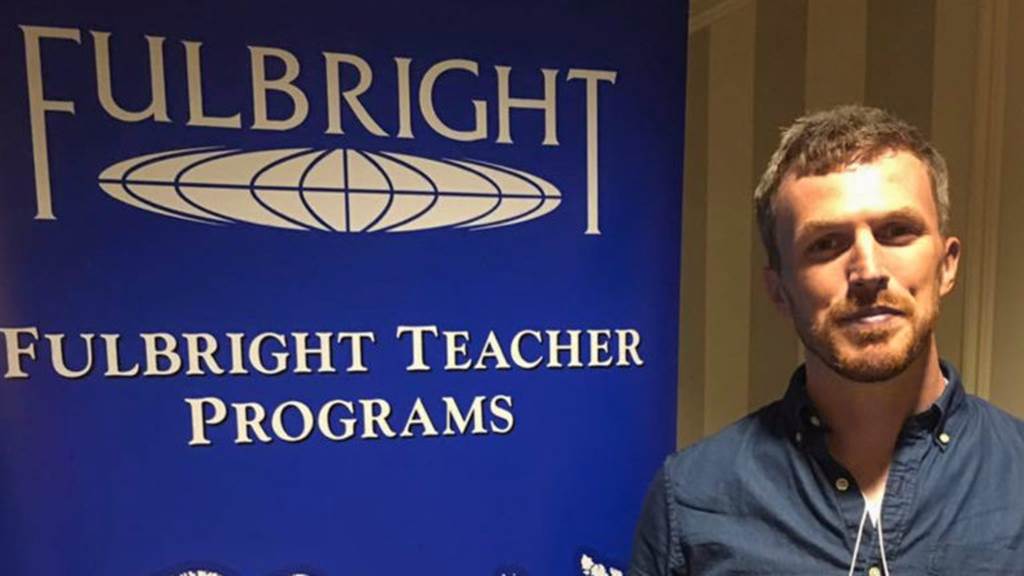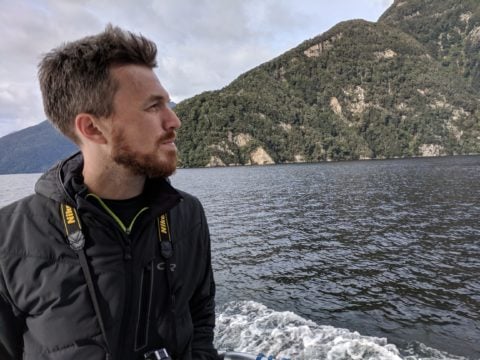Fulbright Winner Hopes to Inspire More Teachers to Travel
10 January 2019
When a colleague received the Fulbright Distinguished Award in Teaching, Nathan Ramin says he knew he needed to take a chance on the opportunity and apply himself.

“It is important to get out of the context that you normally teach in and see other parts of the world,” says North Lawndale College Prep teacher, Nathan Ramin. “I think it makes you a better teacher.”
Ramin, who traveled to New Zealand in January of 2018, wants to encourage other teachers to see the world too. He says learning doesn’t end with the diploma. Since beginning his teaching career 11 years ago on the city’s West Side, he has continuously searched for ways to expand and develop his teaching skills.
When a colleague received the Fulbright Distinguished Award in Teaching, Ramin says he knew he needed to take a chance on the opportunity and apply himself. The Fulbright program is a professional development program for teachers offered in another country. For Ramin, it was a “dream come true.”
He says he will never forget one particular day on the trip that was filled with lots of dancing and laughter. We sat down with him to learn more, as well as what it takes to qualify for the Fulbright award and how living in New Zealand changed his worldview.
Answers have been edited for length and clarity.
Q: How did you feel when you found out you’d won the award?
A: I found out I won right around parent-teacher conferences in April. I received an email and I saw Fulbright on it, and I thought it may be happening. I decided not to look until I got home. Once I got home I opened it with my wife. It was unbelievable. I didn’t believe it was happening until I actually left for New Zealand in January of 2018.
Q: What was an average day like for you in New Zealand?
A: My adviser helped me choose one community right outside of Wellington City Center. I engaged with a tribal education center and three schools that served students who were affiliated with that tribe. At the community center, they supported parents when they had to go to meetings and they make sure students were taught, not just in the traditional school setting, but in the context of their traditional learning settings of the Maori people there.
The schools were also very helpful. I was able to interview and hold focus groups with 53 people across the three schools, including some parents and student groups, to see how they felt about their educational experiences.
Q: How did you first learn about the Fulbright Program?
A: I never thought of my education as a teacher, as a finished product. Every year, I look for grants to take me places where I can expand my ability to teach in a classroom Fulbright came across my desk, and I decided to take a long-shot and apply for it. Another colleague of mine at the school had been accepted the year before and said that he had an excellent experience doing it. I guess you can say I was following in his footsteps.
Q: It sounds like you already knew Fulbright was the program for you. Did that make the application process easier. Can you describe the process?
A: It was a long process. There was a lot of reading and a lot of writing. I had to do an enormous amount of research to make sure what I planned on looking at was something new and different and useful. I submitted my project in October. They got back to me in February asking for revisions with a quick turnaround. Then I went through three rounds of interviews. It was pretty intense, but good.
Q: What about New Zealand attracted you as a scholar?
A: New Zealand seemed to be a good fit because it was a place that was already doing some of the things that I wanted to look for in my project. New Zealand, in some ways, has a similar history and similar issues to the United States. I wanted to see how they were approaching some of the problems that I was seeing at my school and in the community that I teach in.
At the end of the day, one of my core beliefs as an educator is that every student should have equitable access to a high-quality education. From what I saw, there was an attempt in New Zealand to make that a reality. I’m not sure if we can always say that’s the case in the United States. I wanted to see if that really was the reality there and if there was something that we could learn from them.
Q: What was the research question you hoped to have answered in New Zealand?
A: My original research question was related to the use of culturally sustaining and place-based ideologies to improve student engagement in the classroom. After getting there, I worked with the university adviser and came around to the idea of looking at community engaged education practices in New Zealand.
My thought was that schools that engage with their community, using the tenants of culture sustaining and place-based education, were better able to serve their students. I was really able to meet the right people to show me what was going on.
Q: What made your time in New Zealand really stand out?
A: My entire career, I’ve worked on the West Side of Chicago and have been very focused on one community and the need of that community. In New Zealand, I was observing in schools all over the country, from Wellington to Audubon. I got to see a lot of different students and teachers working in educational contexts, and people were so incredibly generous to me with their time and resources.
One of the last things that happened to me at one of the schools I visited still sticks with me today. I went to Student Day at the Marae. The students were working on a specific type of song and dance that they do. I showed them some videos of students that I had on the step team at my school, and they could not get enough of that. I showed those videos over and over again. At the end of the day, they decided that they needed to send a video of their performance back to my students. It was very touching and heartwarming. It just showed the international connection that we can build with students.

Ramin Pictured Crossing the Cook Strait
Q: Have you noticed a difference within yourself in the classroom now that you’ve been back?
A: My reading and my research have altered how I approach some aspects of my teaching. I think my goal right now is to make sure that I am preparing my students in a way that allows them to learn within the context of their communities.
What’s really exciting is that one of the schools in New Zealand contacted me about doing an exchange so we can have our students talk to one another. We haven’t been able to set it up yet, but I hope that we will soon.
Q: You’ve been teaching for 11 years. Do you see yourself continuing as an educator, or has this experience broadened what you hope to do in the world of education?
A: I think yes to both. It was such a privilege to be able to step back from the classroom and really think about what I do and why I do it. I’ve been telling my wife that what I would really love to do is teach in a high school setting, but also do some research and writing on the side.
Q: How do you hope to inspire other teachers possibly considering Fulbright?
A: It is important to get out of the context that you normally teach in and see other parts of the world. I think it makes you a better teacher. I applied for different projects and grants every single year. It takes a lot of practice to make anything work, and I think it’s extremely important to continue to apply to things and not get discouraged. Applying for opportunities like Fulbright gives you that opportunity. I couldn’t recommend it more.
Related Stories
25 April 2025
Taking a Leap of Faith: First-Year AP Shares Her Journey to School Leadership
AP Jordan thrives in leading with compassion and love each and every day.
24 April 2025
Creating and Collaborating in Broadcasting Class: Take Five with Roderick Haygood
Before joining CPS, Mr. Haygood gained valuable on-the-ground experience working as a television and radio station supervisor.
23 April 2025
Making a Difference for Students with Disabilities
Ms. D'Vignon sees the importance of ensuring that her students receive a quality education and have a rightful presence in the classroom.
18 April 2025
Celebrating Mariachi in Music Class: Take Five with Phillip Olazaba
Mr. Olazaba is known for being a caring teacher who has high expectations while still making learning fun.




